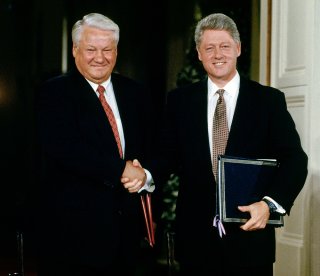Deceit, Dread, and Disbelief: The Story of How Ukraine Lost Its Nuclear Arsenal
Never-before-released archival files reveal Washington’s error in cudgeling Ukraine to give up its nuclear weapons despite the risk of a Russian invasion.
Ukraine may very well have had the means to operate a nuclear arsenal.
Maintaining those weapons would have potentially deterred Russia, and there are now very few reasons to doubt the Kremlin’s long-term plans to invade its neighbor date back to the 1990s. This outcome was also something top American officials worried about at the time themselves.
Documents unearthed in the last two years similarly undermine the presumption that moral arguments about global nonproliferation played a predominant role in Ukraine’s renunciation of nuclear arms. Rather than embarking on an idealistic crusade to reduce the number of nuclear weapons worldwide, it was more of a shell game carried out with the grittiest and most realpolitik of aims: calming Russian insecurities about the size of its nuclear stockpile compared to the United States and shoring up a legal regime that would soon become a dead letter.
And while the archival record also reveals key moments of self-awareness about the threat Russia posed, American officials pushed ahead regardless—seemingly reassured in the misapprehension that Russian aggression could be negotiated or theorized away in the future.
These officials wanted to bring Yeltsin and company into the democratic fold and were willing to pay almost any price to see that happen. It was a gamble—a well-meaning and perhaps even worthwhile one—but the chips they were gambling belonged to someone else.
And what did Ukraine get? With over 100,000 Ukrainian souls lost since 2014 and a trillion dollars of wreckage piled high by Mr. Putin’s war, the country’s brief interregnum of peaceful independence offers little solace.
The only thing Ukraine didn’t get was what it wanted all along: Not nuclear weapons, but the security those weapons provide. Ukrainians would have gladly traded every warhead for serious means by which they could have quashed its neighbor’s imperial impulses. But that was denied to Kyiv as well.
The tale of Ukraine’s disarmament is really one of great powers haggling over a vulnerable nation’s fate despite its protests and legitimate concerns about regional security. That is the true story of the Budapest Memorandum. Then, as now, close-minded determinism bears grave dangers. It’s time policymakers came to full grips with that reality.
George E. Bogden is a Krauthammer Fellow and an Olin Fellow at Columbia Law School. The Smith Richardson Foundation, the German Marshall Fund, the British Library, and the Kennan Institute funded his research for this article.
Image: Mark Reinstein / Shutterstock.

